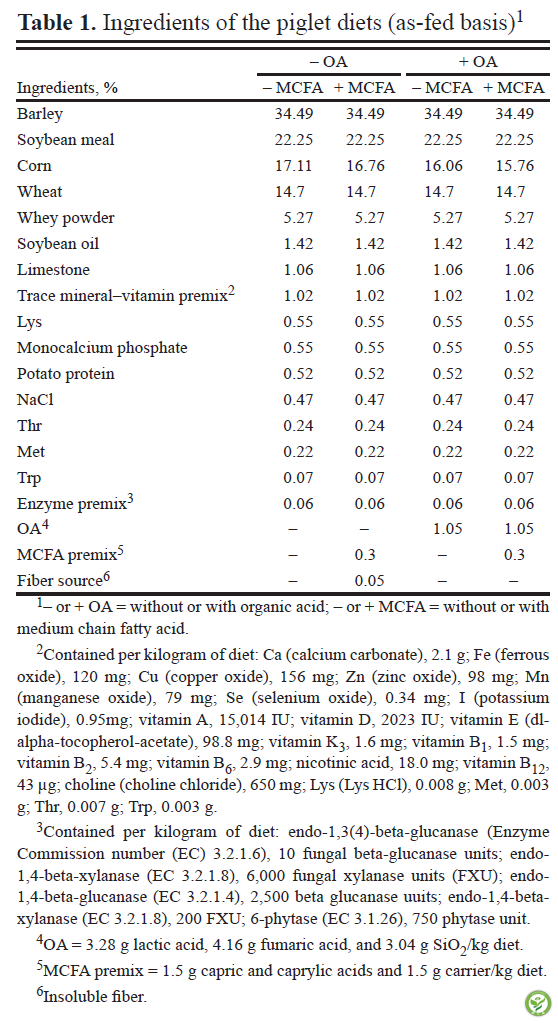原标题:饲喂含有有机酸和中链脂肪酸组合的日粮对断奶仔猪消化道的胃肠道微生态和细菌代谢产物的影响
(Effects of dietary combinations of organic acids and medium chain fatty acids on the gastrointestinal microbial ecology and bacterial metabolites in the digestive tract of weaning piglets)
作者:J. Zentek,*2 F. Ferrara,* R. Pieper,* L. Tedin,* W. Meyer,† and W. Vahjen*
*Institute of Animal Nutrition, Department of Veterinary Medicine, Freie Universität Berlin
Königin-Luise-Str. 49, Berlin, Germany; and †Institute of Anatomy, University of Veterinary Medicine, Foundation,Bischofsholer Damm 15, 30173 Hannover, Germany
来源: J. Anim. Sci. 2013.91:3200–3210
翻译:肠动力研究院 梁琦
【摘要】有机短链和中链脂肪酸常添加于仔猪日粮,因为它们对消化过程和肠道微生物群产生影响。在这项研究中,48栏(2头仔猪/栏)仔猪随机分饲4种日粮,4种日粮为①无添加剂(对照)、②添加有机酸(OA; 0.416%富马酸和0.328%乳酸)、③添加中链脂肪酸(MCFA; 0.15%辛酸和癸酸)与④OA和MCFA组合,通过4种日粮饲喂的12栏仔猪评估胃肠道微生物群的变化。4周后每组取8-9只仔猪安乐死。测定仔猪食糜中的有机酸,MCFA和pH,并通过Q-PCR测定肠道微生物群。实验结果显示:不同的日粮对仔猪生长性能没有影响。富马酸浓度的增加值低于小肠上部的检测下限,食糜中乳酸浓度则不受的影响。MCFA处理组仔猪的胃内MCFA浓度恢复正常,但在小肠上部浓度下降。与空白组仔猪相比,饲喂OA日粮的仔猪的结肠食糜中短链脂肪酸(SCFA)浓度降低(P=0.029)。MCFA能够使食糜pH降低,可能是由于细菌产酸的影响。添加OA增加了类杆菌属-卟啉单胞菌属-普雷沃菌属和胃内梭菌集群XIVa,I和IV,空肠梭菌集群XIVa和回肠中类杆菌属-卟啉单胞菌属-普雷沃菌属细胞计数并且减少了结肠中链球菌属计数(P<0.05)。MCFA仅引起胃肠道微生物群的轻微变化,但增加了空肠中的大肠杆菌-哈夫尼菌属-贺志杆菌群和结肠食糜中梭菌集群XIVa的细胞计数(P<0.05)。喂食添加OA日粮的仔猪结肠中,发现STb(est-II)阳性的大肠杆菌的平均细胞计数减少。总之,从本研究得到的数据表明,OA和MCFA对仔猪肠道微生态有影响。OA可以使短链脂肪酸和MCFA的组合(能够降低肠道PH和减少大肠杆菌毒力基因)成为令人关注的肠道菌群调节剂,最终能够防止断奶仔猪腹泻。
【关键词】细菌代谢产物;消化道;富马酸;乳酸;中链脂肪酸;微生态学
以下是实验中的相关图表
表1:仔猪日粮的组成成分(作为饲喂基础)

表2:分析和计算仔猪日粮的营养组成成分(作为饲喂基础)

表3:饲喂含有有机酸和中链脂肪酸日粮的仔猪的最初和最终体重,日增重,日采食量和饲料转化效率

表4:饲喂含有有机酸和中链脂肪酸日粮的仔猪的胃肠道上部的辛酸和癸酸的浓度(g/kg食糜)

表5:饲喂含有有机酸和中链脂肪酸日粮的仔猪的胃,空肠,回肠,以及结肠食糜的乳酸,短链脂肪酸,富马酸和甲酸的浓度

表6:饲喂含有有机酸和中链脂肪酸日粮的仔猪的十二指肠,空肠,回肠,盲肠和结肠食糜PH值

表7:饲喂含有有机酸和中链脂肪酸日粮的仔猪的胃,空肠,回肠和盲肠食糜的菌群和种类

表8:饲喂含有有机酸和中链脂肪酸日粮的仔猪的结肠食糜中大肠杆菌致病菌种(log10/g)的细胞计数

结论
总之,尽管OA和MCFA都对肠道微生物群和腔内代谢产物的组成有影响,但从研究获得的数据中并不能证明动物生产性能与胃肠道微生物群存在一定关联的假设。根据本研究的观测,OA可以减少肠道中的病原菌,以及MCFA对胃和小肠pH的影响似乎是相关的。这两者可以用于维持仔猪断奶后阶段的肠道健康。
Abstract
Organic short and medium chain fatty acids are used in diets for piglets because they have an impact on the digestive processes and the intestinal microbiota. In this study, 48 pens (2 piglets/pen) were assigned randomly to 4 diets, without additive (control), with organic acids (OA; 0.416% fumaric and 0.328% lactic acid), with medium chain fatty acids (MCFA;0.15% caprylic and capric acid), and a combination of OA and MCFA, to assess changes in the gastrointestinal microbiota with 12 pens per diet. Eight to nine piglets from each group were euthanized after 4 wk. Organic acids, MCFA, and pH in the digesta were determined and the intestinal microbiota was quantified by realtime PCR. The different diets had no effect on the growth performance. Concentration of added fumaric acid was below the detection limit in the upper small intestine whereas the concentration of lactic acid in the digesta was not affected by the treatments. The added MCFA was recovered in the MCFA treated groups in the stomach, but the concentrations declined in the upper small intestine. Concentration of short chain fatty acids was reduced in the colon digesta in piglets fed diets with OA compared with those fed unsupplemented diets (P=0.029). The MCFA resulted in a pH reduction of the digesta, likely because of the effect on bacterial acid production. The addition of OA increased cell counts of Bacteroides-Porphyromonas- Prevotella group and clostridial clusters XIVa, I, and IV in the stomach, the clostridial cluster XIVa in the jejunum, and Bacteroides-Porphyromonas-Prevotella in the ileum and reduced counts of Streptococcus spp. in the colon (P<0.05). The MCFA induced only minor changes in the gastrointestinal microbiota but increased cell counts for the Escherichia-Hafnia-Shigella group in the jejunum and the clostridial cluster XIVa in the colon digesta (P < 0.05). In the colon of piglets fed diets with organic OA, reduced mean cell counts of STb (est-II) positive Escherichia coli were found. In conclusion, OA and MCFA had effects on the intestinal microecology in piglets. The decrease of the intestinal pH and the reduction of E. coli virulence genes by OA could make the combination of short chain fatty acids and MCFA as interesting gut flora modifiers, which can eventually prevent postweaning diarrhea.
Key words: bacterial metabolites, digestive tract, fumaric acid, lactic acid, medium chain fatty acids, microbial ecology
Conclusion
In conclusion, the data obtained from the studydo not support the assumption of synergism in termsof animal performance and the gastrointestinal microbiota although both OA and MCFA had an impact on the composition of the intestinal microbiota and the intraluminal metabolites. Based on the present observations, the reduction of pathogenic bacteria in the intestinal tract by OA as well as the effect of MCFA on the pH in the stomach and small intestine seem to be relevant. Both could be useful for maintaining the health of piglets in the period after weaning.
如您需原文,请联系本文作者和出版方,或请垂询肠动力研究院。本网站发布的所有资料将尽最大可能注明出处、作者及日期,如无意中侵犯了您的知识产权,请来信及时告知,我们将立即予以删除。
All information released by the WeChat Official Account will do its best to indicate the source, author and date. If we inadvertently infringe on your intellectual property, please inform us in time and we will delete it immediately.







